I'm relatively new to multithread programming. I wrote a program which is calculating the squares from 0 - 10000 and saving them into an array. The sequential program is running much faster than the parallel. In my parallel program I have divided the loop into 8 threads (my machine has 8 cores) but it is much slower! Anyone an idea why this is the case? I have added the screenshots of the execution times.
/*Here is the normal program:*/
#define ARRAYSIZE 10000
int main(void) {
int array[ARRAYSIZE];
int i;
for (i=0; i<ARRAYSIZE; i++)
{
array[i]=i*i;
}
return 0;
}
/*Here is the parallelized calculation. Used from http://ramcdougal.com/threads.html*/
#include <stdio.h>
#include <pthread.h>
#define ARRAYSIZE 10000
#define NUMTHREADS 8 /*Cause have 8 core on my machine*/
struct ThreadData {
int start;
int stop;
int* array;
};
void* squarer (struct ThreadData* td);
/* puts i^2 into array positions i=start to stop-1 */
void* squarer (struct ThreadData* td)
{
struct ThreadData* data = (struct ThreadData*) td;
int start=data->start;
int stop=data->stop;
int* array=data->array;
int i;
for(i= start; i<stop; i++)
{
array[i]=i*i;
}
return NULL;
}
int main(void) {
int array[ARRAYSIZE];
pthread_t thread[NUMTHREADS];
struct ThreadData data[NUMTHREADS];
int i;
int tasksPerThread= (ARRAYSIZE + NUMTHREADS - 1)/ NUMTHREADS;
/* Divide work for threads, prepare parameters */
/* This means in my example I divide the loop into 8 regions: 0 ..1250,1250 .. 2500 etc., 2500 .. 3750 */
for(i=0; i<NUMTHREADS;i++)
{
data[i].start=i*tasksPerThread;
data[i].stop=(i+1)*tasksPerThread;
data[i].array=array;
data[NUMTHREADS-1].stop=ARRAYSIZE;
}
for(i=0; i<NUMTHREADS;i++)
{
pthread_create(&thread[i], NULL, squarer, &data[i]);
}
for(i=0; i<NUMTHREADS;i++)
{
pthread_join(thread[i], NULL);
}
return 0;
}

